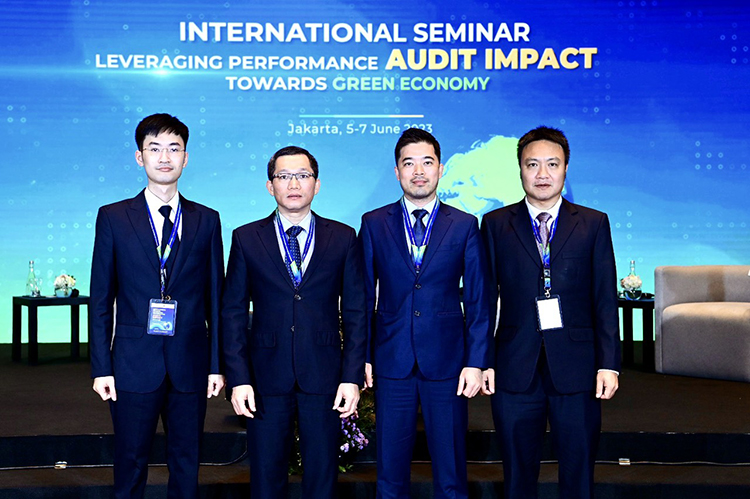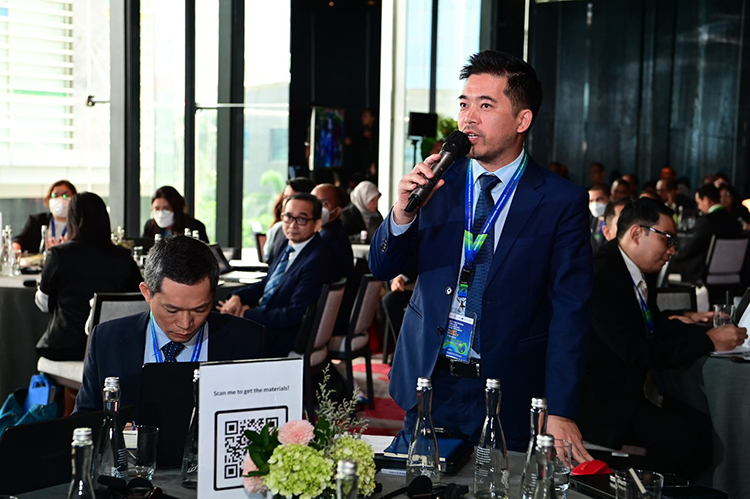From June 5 to 7, 2023 in Jakarta, Indonesia, the international seminar on "Leveraging performance audit impact towards green economy" was held by the Audit Board of the Republic of Indonesia (BPK). The seminar was attended by representatives from 14 Supreme Audit Institutions and representatives of the United Nations, the International Organization of Supreme Audit Institutions (INTOSAI), the European Court of Auditors (ECA), the World Bank and other relevant ministries/institutions, and universities of Indonesia.

SAV’s delegation at the seminar
The technical delegation from the State Audit Office of Viet Nam (SAV) attended the seminar with four members, led by Mr. Nguyen Viet Hung - Deputy Director General of the International Cooperation Department.
During the seminar, the delegates discussed two main groups of issues related to "Green Ecosystem" and "Audit Impact towards green economy".
The event focused on identifying various stakeholders while analyzing their respective roles when participating in the green economy, shared and discussed the challenges, good practices and solutions to enhance the impact of performance audits on the green economy, specifically through the audit on the implementation of Sustainable Development Goals (SDGs) across different countries.
Opinion exchanging during the seminar
In the face of the COVID-19 pandemic and the current risk of economic recession, the concepts of "green economy", and "green innovation" are gaining more traction on international agendas. With growing concerns around negative impacts of economic growth patterns on environment, international community in general along with Supreme Audit Institutions (SAIs) are making efforts to identify solutions aimed at maintaining a sustainable economy- society. The aim of the green economy is to assure long-term human welfare while reducing environmental effects. Some basic elements defining the core inputs are investment in natural capital, reduction of carbon emissions and creation of green jobs. In contrast to economies that are based on non-renewable resources and inefficient methods, the green economy is based on business activities and other economic transactions that are independent of or harmless to the environment.
The concept of a green economy is a commitment to both increasing economic value and protecting the environment, while still generating profits. Green growth focuses on responsible use of energy, due attention to global warming, efficient utilization of resources, reforestation to minimise environmental pollution and damage.
Key attributes of green innovation include administrative regulatory policies, market-based regulatory policies and corporate organizational structures. Administrative regulatory policies could be programs on voluntary emission reduction and environmental enforcement. Market-based regulatory policies could be fair trading of carbon emissions, and sulfur dioxide emissions. Corporate organizational structure could be pressured by stakeholders, and environmental quality management system. The results stemming from these efforts can be crucial in achieving sustainable development goals, helping businesses balance economic activities with environmental activities.
During the seminar, delegates from SAV gave comments on the roles of the National Assembly and the Government, and institutions needed for a SAI to carry out a green-economy-oriented audit.

SAV’s delegation at the seminar
At the seminar's conclusion, the delegates reached a consensus on the role and significance of the performance audit in relation to the green economy. It is recommended to enhance coordination between stakeholders and SAIs in conducting audit activities, promoting collaboration among SAIs for sharing experience and conducting joint audits pertaining to complex environmental issues that transcend national borders./.